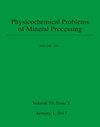Developing a data-driven soft sensor to predict silicate impurity in iron ore flotation concentrate
IF 1.2
4区 工程技术
Q4 CHEMISTRY, PHYSICAL
引用次数: 0
Abstract
Soft sensors are mathematical models that estimate the value of a process variable that is difficult or expensive to measure directly. They can be based on first principle models, data-based models, or a combination of both. These models are increasingly used in mineral processing to estimate and optimize important performance parameters such as mill load, mineral grades, and particle size. This study investigates the development of a data-driven soft sensor to predict the silicate content in iron ore reverse flotation concentrate, a crucial indicator of plant performance. The proposed soft sensor model employs a dataset obtained from Kaggle, which includes measurements of iron and silicate content in the feed to the plant, reagent dosages, weight and pH of pulp, as well as the amount of air and froth levels in the flotation units. To reduce the dimensionality of the dataset, Principal Component Analysis, an unsupervised machine learning method, was applied. The soft sensor model was developed using three machine learning algorithms, namely, Ridge Regression, Multi-Layer Perceptron, and Random Forest. The Random Forest model, created with non-reduced data, demonstrated superior performance, with an R-squared value of 96.5% and a mean absolute error of 0.089. The results suggest that the proposed soft sensor model can accurately predict the silicate content in the iron ore flotation concentrate using machine learning algorithms. Moreover, the study highlights the importance of selecting appropriate algorithms for soft sensor developments in mineral processing plants.开发数据驱动的软传感器预测铁矿石浮选精矿中硅酸盐杂质
软传感器是一种数学模型,用于估计难以直接测量或成本高昂的过程变量的值。它们可以基于第一原理模型、基于数据的模型或两者的组合。这些模型越来越多地用于矿物加工,以估计和优化重要的性能参数,如磨机负荷、矿物品位和粒度。本研究研究开发了一种数据驱动的软传感器,用于预测铁矿石反浮选精矿中的硅酸盐含量,这是工厂性能的关键指标。所提出的软传感器模型采用了从Kaggle获得的数据集,该数据集包括对工厂进料中的铁和硅酸盐含量、试剂剂量、纸浆的重量和pH以及浮选装置中的空气量和泡沫水平的测量。为了降低数据集的维数,应用了无监督机器学习方法主成分分析。软传感器模型是使用三种机器学习算法开发的,即岭回归、多层感知器和随机森林。随机森林模型是用非简化数据创建的,表现出优异的性能,R平方值为96.5%,平均绝对误差为0.089。结果表明,所提出的软传感器模型可以使用机器学习算法准确预测铁矿石浮选精矿中的硅酸盐含量。此外,该研究强调了为选矿厂的软传感器开发选择合适算法的重要性。
本文章由计算机程序翻译,如有差异,请以英文原文为准。
求助全文
约1分钟内获得全文
求助全文
来源期刊

Physicochemical Problems of Mineral Processing
CHEMISTRY, PHYSICAL-MINING & MINERAL PROCESSING
自引率
6.70%
发文量
99
期刊介绍:
Physicochemical Problems of Mineral Processing is an international, open access journal which covers theoretical approaches and their practical applications in all aspects of mineral processing and extractive metallurgy.
Criteria for publication in the Physicochemical Problems of Mineral Processing journal are novelty, quality and current interest. Manuscripts which only make routine use of minor extensions to well established methodologies are not appropriate for the journal.
Topics of interest
Analytical techniques and applied mineralogy
Computer applications
Comminution, classification and sorting
Froth flotation
Solid-liquid separation
Gravity concentration
Magnetic and electric separation
Hydro and biohydrometallurgy
Extractive metallurgy
Recycling and mineral wastes
Environmental aspects of mineral processing
and other mineral processing related subjects.
 求助内容:
求助内容: 应助结果提醒方式:
应助结果提醒方式:


